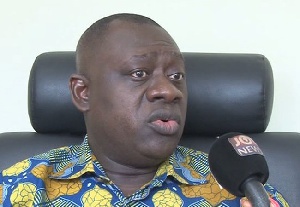Chairman of the Subsidiary Legislative Committee of Parliament of Ghana, Hon. Osei Bonsu Amoah, has told critics of the House over delays in receiving a Bill that changes the date of the country’s general elections from December 7 to November 7 to review their stance.
He said under no circumstances can the legislature be blamed in that regard, insisting that Parliament has no mandate or authority to initiate the process.
Parliament has for the past week come under severe criticism from a section of the public for not doing much to ensure that the Bill that seeks to change the date of the country’s polls is received and passed on time to avoid any chaos that may arise.
To the critics, the country should have made a lot of progress six months into the general polls as far as the Bill is concerned.
In the view, the timeframe with which to consider and pass the Bill raises uncertainty over the proposed November 7 date, noting that Parliament should partly be blamed for the situation the country now finds itself in.
But the Akuapem South legislature responding to the matter on TV 3’s New Day Programme, Saturday, May 21, 2016, disagrees.
According to him, Parliament is yet to receive the Bill and if there is any institution to blame for the mishap, it should be the Attorney-General’s Department.
“The EC made a proposal to the Attorney General to the effect that they want that provision amended so Attorney General sends it to Cabinet for approval. After the approval, she calls it to be gazetted. So, we are expecting that it is laid in Parliament by the Attorney-General on behalf of the EC”, he argued.
Per the House’s procedure, the proposed Bill has to go through it has to be gazetted two times in three months apart. Beyond that there should be ten days interval before it is sent to Parliament for the First Reading.
After the First Reading, the Speaker then refers the Bill to the Council of State where they have thirty (30) days within which to consider it. After the Council of State has considered the Bill, it then comes back to Parliament for it to be referred to the Constitutional and Legal Affairs Committee for consideration and report to the Speaker at the plenary.
After submitting the report, it goes for a Second Reading where two-thirds of Members are supposed to agree to the Bill.
After that it goes to the Consideration Stage where inputs and amendments are made if any before it goes to a Third Reading stage where two-thirds of Members are again expected to agree to the amendments for it to be passed.
The first gazette of the Bill, Kasapafmonline.com learnt, was made on March 9, 2016. That means the second gazette is expected to be made June 9, 2016 if the thirty-day period is anything to go by.
And with the ten days interval as required by law, the Attorney-General is therefore expected to lay the Bill in Parliament on June 20, 2016 for the First Reading after which the Speaker will refer it to the Council of State for consideration.
According to the Chairman of the Subsidiary Legislative Committee, the tricky aspect of the process is where the Constitution and Legal Affairs Committee will decide to go out for a week or two to solicit the views and opinions of Ghanaians, incorporate it into their report before submitting it to Speaker at the plenary.
He could neither confirm nor deny whether the Bill will be passed on time to enable the elections to be held on the proposed November 7 date.
“So as we speak, I don’t know whether the B ill will have to go through or not for us to have the elections on November 7 or we stick to our December 7”.
General News of Sunday, 22 May 2016
Source: kasapafmonline.com

















